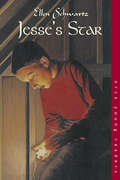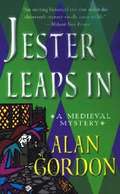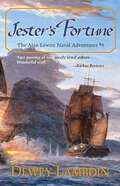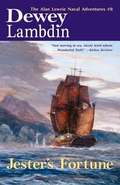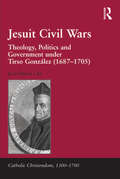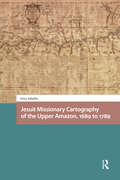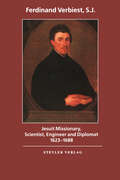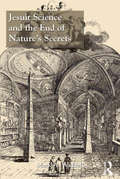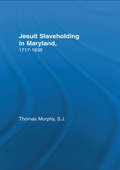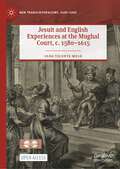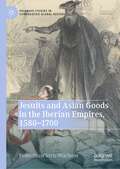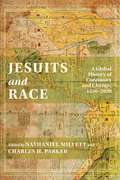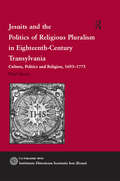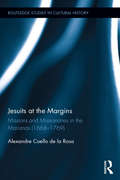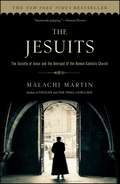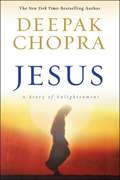- Table View
- List View
Jesse's Star (Orca Young Readers)
by Ellen SchwartzJesse's project about his immigrant ancestors is due tomorrow and he hasn't started. In a last-ditch effort to find some information about his great-great grandfather, Yossi, Jesse rummages through the mess in the attic until he finds a little battered travel case, full of pictures, and something else—a Star of David. At first it looks plain and unimportant, but as he holds it in his hand, the star begins to glow. Jesse is in for the surprise, and adventure, of his life as he finds himself becoming the star's first owner, his own great-great grandfather.
Jessica Ennis: The life story of Team GB's Olympic Golden Girl
by Jessica EnnisOn 4 August 2012 Jessica Ennis kicked off what some described as the greatest night in British sporting history. For her it was the end of a long, winding, and sometimes harrowing road. Nobody was under more pressure at the London Olympics than 'the face of the Games'. Yet Jessica delivered the heptathlon gold medal, and the huge outpouring of relief she showed afterwards hinted at the roller-coaster journey she had been on. Behind the smiles and politeness, Jessica has endured much. Bullied at school for being small, she proved to critics and rivals alike that size really didn't matter. Hers is an inspiring tale of following your dreams no matter what life throws at you. In 2008 Jessica thought her career might be over when she was injured on the eve of the Olympic Games in Beijing. But she overcame this setback to rebuild her career and technique, becoming the world and European champion in successive years. Her biggest test was yet to come, though, when her rivals overhauled her in the build-up to London. Unbelievable is a refreshingly candid account of her rise to fame in a highly charged world in which body image issues and drug abuses lurk. From the unique pressures facing her, to behind-the-scenes glimpses into the greatest show on earth, and a revealing account of her love-hate relationship with her long-term coach, Jessica reveals the truth behind the smiles for the first time. Unbelievable includes exclusive behind-the-scenes photos. This is the story of how the girl next door became London's poster girl, and how an ordinary woman used an extraordinary talent to claim the title of the world's greatest all-round female sports star.
Jessica's Girl: Everyone has secrets…
by Josephine CoxShe must endure horror and heartache, but can she dare to hope for happiness? In a tale of secrets and intrigue, Josephine Cox writes a gritty family saga in Jessica's Girl. Perfect for fans of Kitty Neale and Rosie Goodwin.Despite a deathbed warning from her beloved mother, Phoebe Mulligan has no choice but to throw herself on the mercy of her uncle, Edward. Wrenched from all she holds dear, the tragic young girl is delivered to Blackburn town, where she must live in a household terrorised by the cold, forbidding presence of her mother's brother.Phoebe cannot understand why she is treated so harshly by Edward Dickens. She is not to know the guilty secret that lies in his past, a secret that casts a sinister shadow over his feelings for his lovely niece...What readers are saying about Jessica's Girl: 'A very good read, keeps you guessing until the end. Found it hard to put down''Great story like always - [Josephine Cox] takes me to another world''[Josephine Cox's] books never fail to keep me interested and intrigued as to the outcome. Really enjoyable'
Jessica's Girl: Everyone has secrets…
by Josephine CoxShe must endure horror and heartache, but can she dare to hope for happiness? In a tale of secrets and intrigue, Josephine Cox writes a gritty family saga in Jessica's Girl. Perfect for fans of Kitty Neale and Rosie Goodwin.Despite a deathbed warning from her beloved mother, Phoebe Mulligan has no choice but to throw herself on the mercy of her uncle, Edward. Wrenched from all she holds dear, the tragic young girl is delivered to Blackburn town, where she must live in a household terrorised by the cold, forbidding presence of her mother's brother.Phoebe cannot understand why she is treated so harshly by Edward Dickens. She is not to know the guilty secret that lies in his past, a secret that casts a sinister shadow over his feelings for his lovely niece... What readers are saying about Jessica's Girl: 'A very good read, keeps you guessing until the end. Found it hard to put down''Great story like always - [Josephine Cox] takes me to another world''[Josephine Cox's] books never fail to keep me interested and intrigued as to the outcome. Really enjoyable'
Jessie
by Anna JacobsJessie Burton is lively and intelligent - she wants more than the respectable life in service her mother has planned for her. Times are changing, railways are being built across the land bringing new freedom and possibilities. Jessie tastes that freedom when she meets an ambitious young navvy, newly arrived in Yorkshire. The attraction between them is overwhelming. And Jared Wilde is determined to make Jessie his wife. The primitive, colourful shanty towns that spring up around the railway works are nothing like the safe world Jessie once knew. But in spite of the hardness of life there, she finds happiness with Jared. Until another navvy becomes determined to destroy their future together...
Jessie
by Anna JacobsJessie Burton is lively and intelligent - she wants more than the respectable life in service her mother has planned for her. Times are changing, railways are being built across the land bringing new freedom and possibilities. Jessie tastes that freedom when she meets an ambitious young navvy, newly arrived in Yorkshire. The attraction between them is overwhelming. And Jared Wilde is determined to make Jessie his wife. The primitive, colourful shanty towns that spring up around the railway works are nothing like the safe world Jessie once knew. But in spite of the hardness of life there, she finds happiness with Jared. Until another navvy becomes determined to destroy their future together...
Jessie
by Anna JacobsJessie Burton is lively and intelligent - she wants more than the respectable life in service her mother has planned for her. Times are changing, railways are being built across the land bringing new freedom and possibilities. Jessie tastes that freedom when she meets an ambitious young navvy, newly arrived in Yorkshire. The attraction between them is overwhelming. And Jared Wilde is determined to make Jessie his wife. The primitive, colourful shanty towns that spring up around the railway works are nothing like the safe world Jessie once knew. But in spite of the hardness of life there, she finds happiness with Jared. Until another navvy becomes determined to destroy their future together...(P) 2019 Soundings
Jessie (Big Sky Dreams, Book #3)
by Lori WickToken Creek--1884 Jessie Wheeler knows how to take care of herself and her girls. The owner of Token Creek's general store has been doing it for a long time--nearly eight years--since the day her husband walked out on her. Seth Redding, Jessie's husband, has clone a lot of thinking in those years, some of it in a jail eel Looking back on their marriage, he can't believe he left Jessie and their baby. It was true that Jessie had her own way of doing things and could be hardheaded. But they had shared a special kind of love too, at least early on. If only he'd known then what he knows now... Seth is a changed man, but will he ever be able to show Jessie that? Will she even let him try?
Jester's Fortune
by Dewey Lambdin1796. A diminutive, Corsican-born French general has inherited a ragtag army and turned it into an unstoppable fighting force. Within months, Napoleon's storm rolls across Italy and strikes a lethal blow against the Austrian empire. But while the soil of Piedmont and Tuscany runs with blood, another battle takes shape on the mysterious Adriatic Sea. Alan Lewrie and his 18-gun sloop, HMS Jester are part of a squadron of four British warships and sail into the thick of things. But with England's allies falling, Napoleon busy rearranging the world map, and their squadron stretched dangerously thin along the Croatian coast, the British squadron commander strikes a devil's bargain: enlisting the aid of Serbian pirates.
Jester's Fortune (Alan Lewrie Naval Adventures Ser. #8)
by Dewey LambdinIn 1796, Naval Commander Alan Lewrie's ship is part of a British squadron patrolling the Adriatic Sea against Napoleon's forces. They battle Balkan pirates and rescue an English widow and her child from enemy soldiers. Alan Lewrie and his 18-gun sloop, HMS Jester are part of a squadron of four British warships and sail into the thick of things. But with England's allies falling, Napoleon busy rearranging the world map, and their squadron stretched dangerously thin along the Croatian coast, the British squadron commander strikes a bargain enlisting the aid of Serbian pirates.
Jesuit Accounts of the Colonial Americas
by Hans-Jürgen Lüsebrink Marc André Bernier Clorinda DonatoIn recent years scholars have turned their attention to the rich experience of the Jesuits in France and Spain's American colonies. That attention has brought a flow of new editions and translations of Jesuit accounts of the Americas; it is now time for a study that examines the full range of that work in a comparative perspective. Jesuit Accounts of the Colonial Americas offers the first comprehensive examination of such writings and the role they played in solidifying images of the Americas.The collection also provides a much-needed re-examination of the work of the Jesuits in relation to Enlightenment ideals and the modern social sciences and humanities - two systems of thought that have in the past appeared radically opposed, but which are brought together here under the rubric of modern ethnographic knowledge. Linking Jesuit texts, the rhetorical tradition, and the newly emerging anthropology of the Enlightenment, this collection traverses the vast expanses of Old and New World France and Spain in fascinating new ways.
Jesuit Civil Wars: Theology, Politics and Government under Tirso González (1687-1705) (Catholic Christendom, 1300-1700)
by Jean-Pascal GayFounded in 1540, the Society of Jesus quickly established itself as one of the most dynamic, influential but divisive orders within early-modern Catholicism. Yet whilst the order's role in combating Protestantism, reforming the Catholic Church and advising rulers during its first century has been well documented, much less is understood about its later years. Covering the generalate of Tirso González (1687-1705), this book offers a window onto Jesuit politics and theology during the late seventeenth century. González's generalate was dominated by two crises - one political, the other theological - both of which were to have important ramifications for the Jesuits and the wider Catholic world. The first of these was the confrontation between Louis XIV and the Papacy over the question of control of the church in France. González strongly and publicly supported Pope Innocent XI's primacy over the French clergy, despite widespread opposition from many French Jesuits who took a more 'Gallican' position. The second crisis revolved around González's opposition to the theory of 'Probabilism', to which the bulk of Jesuits subscribed. His publication of a book opposing a theological position that was deeply ingrained within the order, provided another fracture line that was to generate much heat. Whilst both crises were essentially matters for the Jesuits, this study demonstrates how they developed and played themselves out on a wide, international and increasingly public stage, showing how contending identities were forged from apparently narrow but intense and durable conflicts. As such, the book not only illuminates the role and theology of González, but also the tensions within late seventeenth-century Catholicism. It contends that, by the end of the century, Catholic confessional culture appears unable to resolve its contradictory relationship to the individual, which it empowers and dismisses at the same time.
Jesuit Missionary Cartography of the Upper Amazon, 1689 to 1789 (Entanglements, Interactions, and Economies in the Early Modern World)
by Irina SaladinIn the early modern period, members of the Society of Jesus working as missionaries in the so-called mission of Maynas explored vast areas of the upper Amazon. These missionaries belonged to the very small group of Europeans who lived in the forests of the Amazon Basin for longer periods, in close contact with local people. Their daily experiences in the mission, their high level of education, and their connection with the institutional structures of the Jesuit order made them key figures in the production of knowledge about the Amazon. Irina Saladin investigates the complex relationships between mission and knowledge in the context of seventeenth- and eighteenth-century Jesuit maps. She analyzes how Jesuit missionary practices shaped the cartographic representation of the Amazon in the early modern era.
Jesuit Missionary, Scientist, Engineer and Diplomat: Jesuit Missionary, Scientist, Engineer and Diplomat (Monumenta Serica Monograph Series)
by John Witek"The subject of Dr. Lippiello's study is one of bewildering complexity and variety. The book presents the proceedings of the international conference in Leuven in 1988, held in commemoration of the three hundredth anniversary of the death of the Belgian Jesuit Ferdinand Verbiest. Scientist, engineer, and diplomat, he was above all a missionary who contributed significantly to the growth of Christianity in China and to Sino-Western cultural exchange.
Jesuit Science and the End of Nature's Secrets
by Mark A. WaddellJesuit Science and the End of Nature’s Secrets explores how several prominent Jesuit naturalists - including Niccolò Cabeo, Athanasius Kircher, and Gaspar Schott - tackled the problem of occult or insensible causation in the seventeenth century. The search for hidden causes lay at the heart of the early modern study of nature, and included phenomena such as the activity of the magnet, the marvelous powers ascribed to certain animals and plants, and the hidden, destructive forces churning in the depths of the Earth. While this was a project embraced by most early modern naturalists, however, the book demonstrates that the Jesuits were uniquely suited to the study of nature’s hidden secrets because of the complex methods of contemplation and meditation enshrined at the core of their spirituality. Divided into six chapters, the work documents how particular Jesuits sought to reveal and expose nature’s myriad secrets through an innovative blending of technology, imagery, and experiment. Moving beyond the conventional Aristotelianism mandated by the Society of Jesus, they set forth a vision of the world that made manifest the works of God as Creator, no matter how deeply hidden those works were. The book thus not only presents a narrative that challenges present-day assumptions about the role played by Catholic religious communities in the formation of modern science, but also captures the exuberance and inventiveness of the early modern study of nature.
Jesuit Slaveholding in Maryland, 1717-1838 (Studies in African American History and Culture)
by Thomas MurphyFrom the colonial period through the early nineteenth century, Father Thomas J. Murphy writes a compelling chronology and in depth analysis of Jesuit slaveholding in the state of Maryland.
Jesuit Student Groups, the Universidad Iberoamericana, and Political Resistance in Mexico, 1913-1979
by David EspinosaThe history of Mexico in the twentieth century is marked by conflict between church and state. This book focuses on the efforts of the Roman Catholic Church to influence Mexican society through Jesuit-led organizations such as the Mexican Catholic Youth Association, the National Catholic Student Union, and the Universidad Iberoamericana. Dedicated to the education and indoctrination of Mexico&’s middle- and upper-class youth, these organizations were designed to promote conservative Catholic values. The author shows that they left a very different imprint on Mexican society, training a generation of activists who played important roles in politics and education. Ultimately, Espinosa shows, the social justice movement that grew out of Jesuit education fostered the leftist student movement of the 1960s that culminated in the Tlatelolco massacre of 1968. This study demonstrates the convergence of the Church, Mexico&’s new business class, and the increasingly pro-capitalist PRI, the party that has ruled Mexico in recent decades.Espinosa&’s archival research has led him to important but long-overlooked events like the student strike of 1944, the internal upheavals of the Church over liberation theology, and the complicated relations between the Jesuits and the conservative business class. His book offers vital new perspectives for scholars of education, politics, and religion in twentieth-century Mexico.
Jesuit and English Experiences at the Mughal Court, c. 1580–1615 (New Transculturalisms, 1400–1800)
by João Vicente MeloThis open access book reconstructs and examines a crucial episode of Anglo-Iberian diplomatic rivalry: the clash between the Portuguese-sponsored Jesuit missionaries and the English East India Company (EIC) at the Mughal court between 1580 and 1615. This 35-year period includes the launch of the first Jesuit mission to Akbar’s court in 1580 and the preparation of the royal embassy led by Sir Thomas Roe to negotiate the concession of trading privileges to the EIC, and encompasses not only the extension of the conflict between the Iberian crowns and England into Asia, but also the consolidation of the Mughal Empire. The book examines the proselytizing and diplomatic activities of the Jesuit missionaries, the evolution of English diplomatic strategies concerning the Mughal Empire, and how the Mughal authorities instigated and exploited Anglo-Iberian rivalry in the pursuit of specific commercial, geopolitical, and ideological agendas.
Jesuits and Asian Goods in the Iberian Empires, 1580–1700 (Palgrave Studies in Comparative Global History)
by Pedro Omar Svriz-WuchererThis book analyzes the exchange relations between the colonies of the Iberian Empires, starting from two cities ports, Buenos Aires and Macau in the period 1580-1700. Agents, who were not professional traders such as the members of the Society of Jesus, and the circulation and consumption of Asian goods in the local populations of Buenos Aires and Macau, were analyzed. Both cases of study will show us how these non-state agents- the Jesuits- build their own networks and exchange channels to Chinese goods distribution (i.e silk, porcelain, musk, amber and others) between Asia and Latin American. This book intends to break with the local scheme of Jesuit studies in order to combine the local scale with analysis of inter-regional processes on a continental scale, from a comparative perspective.
Jesuits and Race: A Global History of Continuity and Change, 1530-2020
by Nathaniel Millett; Charles H. ParkerJesuits and Race examines the role that the Society of Jesus played in shaping Western understandings about race and explores the impact the Order had on the lives and societies of non-European peoples throughout history. Jesuits provide an unusual, if not unique, lens through which to view the topic of race given the global nature of the Society of Jesus and the priests&’ interest in humanity, salvation, conversion, science, and nature.Jesuits&’ global presence in missions, imperial expansion, and education lends insight into the differences in patterns of estrangement and assimilation, as well as enfranchisement and coercion, with people from Africa, Asia, and the Americas. The essays in this collection bring together case studies from around the world as a first step toward a comparative analysis of Jesuit engagement with racialized difference. The authors hone in on labor practices, social structures, and religious agendas at salient moments during the long span of Jesuit history in this fascinating volume.
Jesuits and the Politics of Religious Pluralism in Eighteenth-Century Transylvania: Culture, Politics and Religion, 1693–1773
by Paul ShoreThis book tells the story of the Jesuit mission to Cluj, Transylvania (now Romania) from 1693, when the Jesuits were allowed to return after almost a century of restricted activity in the region, until 1773, when the order was suppressed. During these eight decades the Jesuits created a complex, multi-faceted community whose impact reached throughout Transylvania and beyond into neighbouring regions. In addition to an ongoing missionary program in this predominantly non-Catholic region, the Jesuits established a cluster of schools and a university that trained the elite, introduced Baroque architecture, music and literature, and became the masters of extensive properties. The Jesuits' schools staged dramas in several languages, their printing press produced a wide range of publications, including a Hungarian 'ABC for Girls' and a catechism in Ukrainian, and Jesuit scientists, including Miksa Hell, later Court Astronomer in Vienna, conducted experiments and observations. Among the unique features of this study are the accounts of how Jesuits sought to impose social conformity on the ethnically and religiously diverse community, the Jesuits' project to develop a 'Uniate Church' that would retain the Eastern Rite while acknowledging the authority of Rome, and the story of the long-forgotten Jesuit 'brothers', who contributed their talents as craftsmen and artists to the Jesuit enterprise. A chapter is devoted to the ill-fated 1743 mission to Moldavia, in which Transylvanian Jesuits hoped to establish a missionary and educational outpost in this Ottoman-dominated principality. Special attention is given to Jesuit interactions with the many minority groups present in Cluj: Armenians, Jews, Roma (Gypsies), and German speaking 'Saxons', as well as encounters with ethnic Romanians, who made up the majority of the population of Transylvania and among whom the Uniate Church was promoted. Cluj, a city where the cultures of Eastern and Western Europe meet, represented the furthermost penetration into Orthodox Europe of the Baroque aesthetic and of the domination of the Habsburgs, supported and glorified by the Jesuits. The successes and failures of this religious order helped shape the history of the region for the next two centuries.
Jesuits at the Margins: Missions and Missionaries in the Marianas (1668-1769) (Routledge Studies in Cultural History #41)
by Alexandre Coello de la RosaIn the past decades historians have interpreted early modern Christian missions not simply as an adjunct to Western imperialism, but a privileged field for cross-cultural encounters. Placing the Jesuit missions into a global phenomenon that emphasizes economic and cultural relations between Europe and the East, this book analyzes the possibilities and limitations of the religious conversion in the Micronesian islands of Guåhan (or Guam) and the Northern Marianas. Frontiers are not rigid spatial lines separating culturally different groups of people, but rather active agents in the transformation of cultures. By bringing this local dimension to the fore, the book adheres to a process of missionary “glocalization” which allowed Chamorros to enter the international community as members of Spain’s regional empire and the global communion of the Roman Catholic Church.
Jesuits: The Society of Jesus and the Betrayal of the Roman Catholic Church
by Malachi MartinIn The Jesuits, Malachi Martin reveals for the first time the harrowing behind-the-scenes story of the "new" worldwide Society of Jesus. The leaders and the dupes; the blood and the pathos; the politics, the betrayals and the humiliations; the unheard-of alliances and compromises. The Jesuits tells a true story of today that is already changing the face of all our tomorrows.
Jesus
by Deepak ChopraThe New York Times bestselling author of Buddha captures the extraordinary life of Jesus in this surprising, soul-stirring, and page-turning novel. Uncovering the transformational "lost years" that are not recounted in the New Testament, Deepak Chopra has imagined Jesus's path to enlightenment moving from obscurity to revolutionary, from doubt to miracles, and then beyond as the role of the long-awaited Messiah. As a teenager, Jesus has premonitions of his destiny, and by the end, as he arrives to be baptized in the River Jordan, he has accepted his fate, which combines extremes of light and darkness. With his characteristic ability for imparting profound spiritual insights through the power of storytelling, Deepak Chopra's Jesus portrays the life of Christ as never before, ultimately leading us closer to understanding the nature of God and the soul. As the author shares, "I don't want the Jesus in this book to be worshiped, much less to push him forward as definitive. The events of the tale are pure fiction. But at a deeper level, the Jesus in this book feels real because we've gotten a glimpse into his mind. One flash of insight answers many prayers."
